情态动词can,may,must的用法.
英语情态动词can、may、must的用法
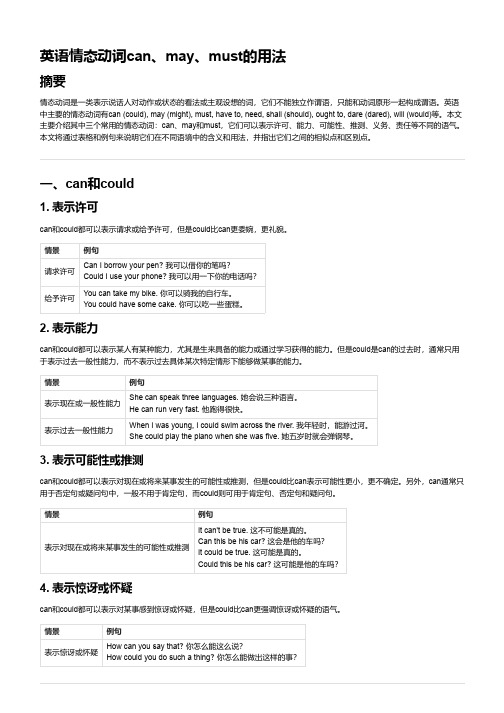
英语情态动词can、may、must的用法摘要情态动词是一类表示说话人对动作或状态的看法或主观设想的词,它们不能独立作谓语,只能和动词原形一起构成谓语。
英语中主要的情态动词有can (could), may (might), must, have to, need, shall (should), ought to, dare (dared), will (would)等。
本文主要介绍其中三个常用的情态动词:can、may和must,它们可以表示许可、能力、可能性、推测、义务、责任等不同的语气。
本文将通过表格和例句来说明它们在不同语境中的含义和用法,并指出它们之间的相似点和区别点。
一、can和could1. 表示许可can和could都可以表示请求或给予许可,但是could比can更委婉,更礼貌。
情景例句请求许可Can I borrow your pen? 我可以借你的笔吗?Could I use your phone? 我可以用一下你的电话吗?给予许可You can take my bike. 你可以骑我的自行车。
You could have some cake. 你可以吃一些蛋糕。
2. 表示能力can和could都可以表示某人有某种能力,尤其是生来具备的能力或通过学习获得的能力。
但是could是can的过去时,通常只用于表示过去一般性能力,而不表示过去具体某次特定情形下能够做某事的能力。
情景例句表示现在或一般性能力She can speak three languages. 她会说三种语言。
He can run very fast. 他跑得很快。
表示过去一般性能力When I was young, I could swim across the river. 我年轻时,能游过河。
She could play the piano when she was five. 她五岁时就会弹钢琴。
3. 表示可能性或推测can和could都可以表示对现在或将来某事发生的可能性或推测,但是could比can表示可能性更小,更不确定。
情态动词小结(共五则)

情态动词小结(共五则)第一篇:情态动词小结情态动词小结情态动词有:can(could),may(might),must,have to, shall(should),will(would),need, dare, ought to等。
一.情态动词can, may, must用法㈠基本用法1.can ⑴ 会,能够--Can you swim?--Yes, I can.--No, I can‟t.⑵口语中代替may.You can(may)park here.你可以把车停在这里。
(许可)2.may允许,许可--May I come in?--Yes, you may./Sure, come on in.--No, you mustn ‟t./No, you can‟t.No, you‟d better not.3.must必须--Must we finish the exercise today?--Yes, you must.--No, you needn‟t./No, you don‟t have to.4.need 需要,必需--Need you go now?=--Must you go now?--Yes, I must.--Yes, I must.--No, I needn‟t.--No, I needn‟t.(need作为情态动词,通常用在否定句和疑问句中。
)注意一:can 与be able to 都可以表示“能力”,区别是:⑴ can只有现在和过去两种形式I can play the piano.She couldn‟t play the piano when she was a little girl.⑵ be able to ①有更多的形式和时态We shall/will be able to finish the work next week.I haven‟t been able to find the book.②指具体一次活动I can swim but I am not able to cross the rough sea.有时两者可以互换: I‟m not able to(can‟t)answer your question.Are you able to(Can you)type(打字)?注意二:could的用法⑴ 作为can的过去式,表示过去的能力。
情态动词的用法口诀

情态动词的用法口诀:情态动词两要点,动词原形跟后边,说话语气较委婉。
can表“能力”,may“许可”,must“责任”或“义务”。
否定答语needn’t换,“需要”need,
dare“敢”,should“应该”,would“愿”,have to“被迫”表客观。
情态动词的用法口诀
情态动词要记牢;动词原形来跟梢。
不管人称单复数;现在过去乐逍遥。
can表能力和许可;也许可能may来表;
必须一定must;should应该来报到。
回答不须needn’t;mustn’t为不必要。
否定只要接not;疑问赶紧往前跑。
什么是情态动词
情态动词(Modal
verbs)本身有一定的词义,表示语气的单词。
但是不能独立作谓语,只能和动词原形一起构成谓语。
情态动词用在行为动词前,表示说话人对这一动作或状态的看法或主观设想。
情态动词虽然数量不多,但用途广泛,主要有下列: can (could), may (might), must, need, ought to, dare
(dared), shall (should), will (would) must
情态动词无人称和数的变化,情态动词后面跟的动词须用原形,否定式构成是在情态动词后面加
"not"。
个别情态动词有现在式和过去式两种形式,过去式用来表达更加客气,委婉的语气,时态性不强,可用于过去,现在或将来。
情态动词属非及物动词,故没有被动语态。
情态动词一can_may_must的用法

情态动词can, may, must的用法
Modal verbs 情态动词
• 情态动词后接动词原形; • 没有人称和数的变化; • 不能单独作谓语, 与后面的动词共同作谓语;
• 其否定形式在后面直接加not。
Modal verbs 情态动词
五.have to的用法
• 表示客观需要 “不得不,必须”
I missed the train, so I had to take a taxi.
在疑问句和否定句中,have to需借助助动词 do ,
Did he have to do it? You don‘t have to go there. (不必,不需要)
• can / can not
• may / may not • must / must not
can / can nຫໍສະໝຸດ t1. 表示能力(会) Mary can speak English, but she can not speak French. 2. 表示允许(可以) 也可用could (不是过去式)更委婉 Can /Could I use your dictionary? 3. 表示推测 (可能 ) ----通常用于否定形式 He can’t be in the office. I saw him go out just now.
She may be still waiting for us.
3. 表示祝愿 May you have a happy weekend.
may / may not
may not的用法:
●以may开头的疑问句,其否定回
情态动词归类大全

情态动词一:情态动词的用法:常用的情态动词有can,may,must,need,should, had better.1. can 的用法:①表示能力“能,会” eg: He can speak a little Japanese.他会说一点日语。
②表示请求或许可“可以” eg: Can I help you? 要我帮忙吗?③表示猜测“可能” eg: Where can she go now? 她可能到哪里去了呢?2.may 的用法:①表示请求或允许“可以”“准许” eg: May I go home,please?请问我可以回家吗?②表示可能性“可能”、也许” eg: I think it may rain this afternoon. 我想今天下午可能下雨。
注:might为may的过去式,但也可以代替may,语气较为婉转客气或更加不肯定。
eg: ① He might not come today.今天他也许不来了。
(语气不肯定)②You might also get a headache when you work too hard,当你工作太努力时,你也可能患头痛3. must的用法:①表示义务、必要或命令“必须、应该” eg: You must come early tomorrow.你明天得早来。
②表示推测时“肯定,一定” eg: They must be at home.The light is on 他们肯定在家,灯亮着呢.③ must not 禁止,不许 eg: You must not tell lies. 你不许撒谎。
注意:①must开头的疑问句,其否定回答通常用 don't have to 或needn't 。
而不用mustn'teg: ---Must I finish my homework first? 我必须先完成作业吗?---No, you don't have to/ needn't. 不,你不必。
英语常见情态动词can will may must need will 的用法

八年级情态动词的用法一、can 的用法:(1) 表示能力。
表示能力时一般译为“能、会”,即有某种能力,尤其是生来具备的能力,此时may 和must 均不可代替它。
例如:He can swim fast, but I can’t. 她能游得很快,但我不能。
She can see with my eyes. 我用眼睛看。
(2) 表示许可,常在口语中。
例如:You can use my dictionary. 你可以用我的字典。
(3) 表示推测。
表示推测时,意为“可能”,常用于否定句和疑问句中,此时can’t 译为“不可能”。
例如:Can the news be true? 这个消息会是真的吗?— Can the man be our teacher?那个人有可能是我们老师吗?— No, he can’t be our teacher. Our teacher is on a visit to the Great Wall.不可能。
咱们老师正在游览长城呢。
二、could的用法:(1)can的过去式,意为“能、会”,表示过去的能力。
例如:He could write poems when he was 10. 他十岁时就会写诗。
(2)could在疑问句中,表示委婉的语气,此时could 没有过去式的意思。
例如:Could you do me a favour? 你能帮我个忙吗?— Could I use your ruler? 我能用一下你的钢笔吗?—Yes, you can.可以。
三、may的用法:(1) 表示请求、许可,比can 正式。
例如:May I borrow your book? 我可以借你的自行车吗?You may go home now. 现在你可以回家了。
(2) 表示推测,谈论可能性,意为“可能,或许”,一般用于肯定句中。
例如:It may rain tomorrow. 明天可能会下雨。
Unit 6 Electricity情态动词can,may,must

Unit 6 ElectricityDate:_______ name:_______【知识要点】小议can,may,must情态动词有具体的词义,但也同助动词一样,需要与其他词语一起构成句子的谓语,另外情态动词没有人称和数的变化,情态动词后必须跟动词原形。
1.can的用法(1)表示能力、许可、可能性。
表示能力时一般译为“能、会”,即有某种能力,尤其是生来具备的能力,此时may和must均不可代替它。
如:She can swim, but I can't. 她能游泳,但我不能。
I can see with my eyes. 我能用眼睛看。
(2)表示许可,常在口语中。
如:You can use my dictionary. 你可以用我的字典。
(3)表示推测,意为“可能”,常用于否定句和疑问句中,此时can't译为“不可能”。
如: ---- Can the news be true? ---- No, it can't be.2.may的用法(1)表示请求、许可,比can委婉,如:May I borrow your bike? 我可以借你的自行车吗?You may go home now. 现在你可以回家了。
(2)表示推测,谈论可能性,意为“可能,或许”,一般用于肯定句中。
如:It may rain tomorrow. 明天可能会下雨。
She may be at home. 她可能在家。
3.must的用法(1) must表示主观看法,意为“必须、一定”。
如:You must stay here until I come back. 在我回来之前你必须呆在这儿。
Must I hand in my homework right now? 我必须现在交作业吗?(2)对must引导的疑问句,肯定回答为must,否定回答为don't have to或needn't。
如:--- Must I finish my homework? 我现在必须完成作业吗?--- No, you don't have to/needn't. 不,你没有必要现在完成作业。
情态动词may,can,must

情态动词may,can,must情态动词:本身有一定的词义,表示说话人的情绪、态度、语气,但不能单独做谓语,只能和其他动词原形构成谓语。
常见的情态动词有may,can,must,need 等。
1.may:表可能性,用于肯定句中,意为“可能”He may be a good father but he may not be a good husband.2.can:(1)意为“能,会”,表示能力,可指某人拥有某种能力例:She can cook.(2)意为“可以”,表示许可,常用语口语,可以用may替代例:Can I have a look?(3)意为“可能”,表示推测,常用于否定句和疑问句,此时“can’t为“不可能”例:This pen looks like mine,yet it isn’t.Whose can it be?这支笔看起来是我的,但它不是,它可能是谁的呢?Tom can’t be his brother,I know all of his brothers.Tom不可能是他的兄弟,我知道他所有的兄弟。
3.must:(1)表有把握的推测,用于肯定句,表示“一定,准是”例:May and Mary must be twins.They really look like each other. (2)其否定形式mustn’t表示“禁止,不准,不允许”例: You mustn’t swim in the lake.(3)对must引导的疑问句回答①肯定回答用must②否定回答用needn’t 或don’t have to例:---Must I finish my homework?我现在必须完成作业吗?---No, you needn’t./ No, you don’t have to. 不,你不必。
(3)must have done一定做过某事例:I see Dad’s car downstairs.He must have come home.(4)must的反义疑问句部分:助动词英语must后面的动词在非推测情况下的用法保持一致例:He must be a worker,isn’t he?You must have learned English for many years,haven’t you?练习:()1.You ______ be very tired after a 13-hour flight from New York to Shanghai.A.canB. mayC. mustD.need()2.-I can’t find my key.-It _____ locked in your room.A.mayB.maybeC.may beD.perhaps()3.-Who told him about this news?Lily?-It ____ her.She doesn’t know the news at all.A.can’t beB.mustn’t beC.shouldn’t beD.may not be()4. -Must I do my homework at once? --No,you _______.A. needn'tB. mustn'tC. can'tD. may not()5. The children___ play football on the road.A.can’tB. canC. mustn'tD. must()6. Even the top students in our class can't work out this problem, so it___ be very difficult.A.mayB. mustC. canD. need()7. -Can you speak Japanese? -No,you ________A.mustn’tB. can'tC. needn'tD. may not()8. He isn't at school. I think he ___ be ill.A.canB. willC. mustD. has to()9. —How long may I keep the book?—You ________ keep it for two weeks.A. mayB. mustC. will()10.-- May I go out now, Dad?-- No. You ______ let your mother know first.A. canB. mayC. needD. must。
情态动词can,may,must的用法.

New Street,__d_o_n_’_t _y_o_u___ ? 9.Mike must have studied French ,_h_a_s_n_’t_h_e____?
5.May I speak to you for a moment,professor? 6.Can I have a cup of tea, mother?
2.猜测、可能性(用于肯定句中) 1.The story may or may not be true.
2.Can that be true? May that be true?
㈡.can与be able to的区别
can有现在时、过去时;可用于被动语态。 be able to有各种时态;指某一次动作;不可用于被动语态。
1.He says he will be able to be home for Christmas.
2.I was able to help you yesterday.
3.This problem can be settled at once.
㈢用句型
1. could have done 本来能够做 2. can/could… have done ? 可能做过…吗? 3. can’t/couldn’t have done 不可能做过
1.She could have explained the matter. 2.Can she have told a lie? 3. Where can/could he have gone? 4.He can’t/couldn’t have said that. 5.She can’t/couldn’t have been at home all this time.
can may must的用法
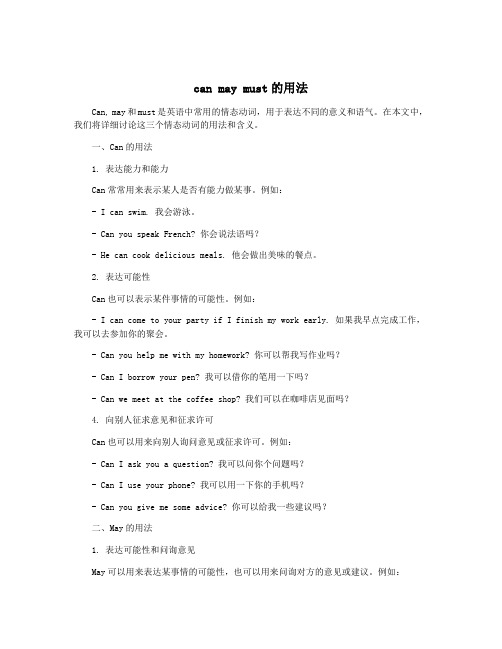
can may must的用法Can, may和must是英语中常用的情态动词,用于表达不同的意义和语气。
在本文中,我们将详细讨论这三个情态动词的用法和含义。
一、Can的用法1. 表达能力和能力Can常常用来表示某人是否有能力做某事。
例如:- I can swim. 我会游泳。
- Can you speak French? 你会说法语吗?- He can cook delicious meals. 他会做出美味的餐点。
2. 表达可能性Can也可以表示某件事情的可能性。
例如:- I can come to your party if I finish my work early. 如果我早点完成工作,我可以去参加你的聚会。
- Can you help me with my homework? 你可以帮我写作业吗?- Can I borrow your pen? 我可以借你的笔用一下吗?- Can we meet at the coffee shop? 我们可以在咖啡店见面吗?4. 向别人征求意见和征求许可Can也可以用来向别人询问意见或征求许可。
例如:- Can I ask you a question? 我可以问你个问题吗?- Can I use your phone? 我可以用一下你的手机吗?- Can you give me some advice? 你可以给我一些建议吗?二、May的用法1. 表达可能性和问询意见May可以用来表达某事情的可能性,也可以用来问询对方的意见或建议。
例如:- May I ask you a question? 我可以问你一个问题吗?- May I have your opinion on this matter? 我可以听听你对这个问题的看法吗?2. 征求许可和邀请May也可以用来征求许可或邀请别人做某事。
例如:- May I borrow your car? 我可以借用你的车吗?- May I have a glass of water? 我可以喝一杯水吗?- May I invite Jane to the party? 我可以邀请简来参加聚会吗?3. 表示礼貌在正式场合中,may也常常用来表达礼貌和尊重。
情态动词的用法
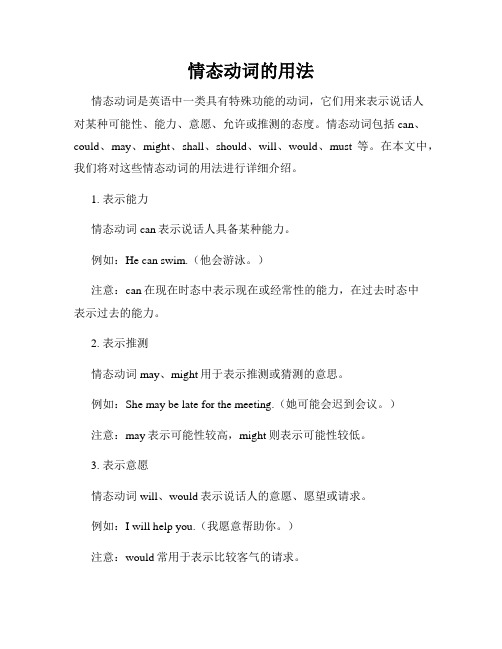
情态动词的用法情态动词是英语中一类具有特殊功能的动词,它们用来表示说话人对某种可能性、能力、意愿、允许或推测的态度。
情态动词包括can、could、may、might、shall、should、will、would、must等。
在本文中,我们将对这些情态动词的用法进行详细介绍。
1. 表示能力情态动词can表示说话人具备某种能力。
例如:He can swim.(他会游泳。
)注意:can在现在时态中表示现在或经常性的能力,在过去时态中表示过去的能力。
2. 表示推测情态动词may、might用于表示推测或猜测的意思。
例如:She may be late for the meeting.(她可能会迟到会议。
)注意:may表示可能性较高,might则表示可能性较低。
3. 表示意愿情态动词will、would表示说话人的意愿、愿望或请求。
例如:I will help you.(我愿意帮助你。
)注意:would常用于表示比较客气的请求。
4. 表示推测的过去情态动词must常用于表示对过去情况的推测或肯定。
例如:He must have missed the bus.(他肯定错过了公交车。
)注意:must用于表示对过去情况的肯定,而might用于表示对过去情况的推测。
5. 表示义务或必要性情态动词must表示对义务、必要性或确定性的肯定。
例如:You must finish your homework.(你必须完成作业。
)6. 表示建议或应该情态动词should表示建议或应该。
例如:You should go to bed early.(你应该早点睡觉。
)注意:should还可以表示对过去情况的推测,例如:He should have arrived by now.(他现在应该已经到达了。
)7. 表示允许或许可情态动词can与may可以用于表示许可或允许。
例如:Can I borrow your pen?(我可以借你的钢笔吗?)8. 表示可能性情态动词could用于表示可能性。
初一英语:情态动词can,must,may的用法

4. 表示说话人的猜测、怀疑、不肯定等,主要用于否定句、疑问句、感叹句中,带哟感情色彩。
How can yo be so rude!Can he be back?5. could可以作为can的过去式,也可以在提出请求时表示委婉。
He could save the little boy.Could you help me?三、may, might1. 表示“许可、准许”,此时与can同义,可以互换使用You may/can go to the cinema this evening.☆注意:表许可时其答语可以用“Yes,you may.”但是由于用may做肯定回答语气显得生硬、严肃,因此一般用Yes, please. /Certainly. / Of course.这些回答显得热情、客气。
拒绝对方时,其答语可以用No, you mustn’t. / No, you can’t. / Sorry, you can’t. / No, please don’t等--May I come in? --Yes, please--May I use your ruler? --Certainly. Here you are.2. 表示可能性时,常用在肯定句中,意为“可能、也许”He may be very busy now.He said that she might not be at work today.3. can和may都可以表示推测。
Can通常用在否定句和疑问句中,may通常用在肯定句和否定句中。
虽然两者都可以用于否定句,但是程度不同,can’t的语气比may not更强。
It can’t be true.It may not be true.4. 表示希望、祈求、祝愿,常可以译为“祝愿”May you have a good time.May you be happy.5. might可以作为may的过去式,也可以在提出请求时表委婉;在表示可能性时,might的可能性比may更小☆注意:can和may的区别1. can和may都可以表示“许可”,在征求对方意见时用may比较多 May I go now?2. 在询问客观上是否可以时,用can Can we take the books out?3. 在两者都可以用时,may更客气一些4. 在陈述句中用can比较多 You can sit here.5. can还可以表示能力,may无此用法6. 在否定句中一般不用may not,常用can’t表示不可能He can’t be at home tonight.四、must1. 表示“必须、一定要”,多强调说话人的主观看法(表示客观需要时,常用_____________)否定式mustn’t表示“一定不要,禁止”You must see the doctor.Must you go soon?对于must开头的一般疑问句,如果要做否定回答,可以用needn’t, don’t have to,不能用mustn’t --Must I come over tonight? --No, you needn’t2. 表示推测,意为“准是,一定是”,但是通常只用于肯定句,在否定句、疑问句中通常用can’t It must be true.Can it be true? It can’t be trueStep 3:Practice一、用can,may,must的适当形式填空1. __________ I ask you a question?2. Attending a ball __________ be exciting3. Michael __________ be a policeman, for he is mush too short.4. –Are you coming to Jeff’s party? --I’m not sure. I __________ go to the concert instead.5. He never takes a taxi. He __________ be very poor.6. I thought you __________ like something to read, so I brought you some books.7. Look! I __________ stand on my hands.8. He __________ have been to Shanghai.9. The play is not interesting. I really __________ go now.10. She __________ like this place.二、根据汉语提示给出下列句子的回答1. –Must we hand in our exercise books today?______________________________.(不,没有必要)2. Can I call you by your first name?______________________________(是的,可以)3. Could I come here again tomorrow?______________________________(是的,你可以来)4. Must we send in our pla this week?______________________________(是的,必须交)5. May I use you pen?______________________________(可以,给你)三、选择1. Helen __________ go on the trip with us, but she isn’t quite sure yet.A shallB mustC mayD can2. Johnny, you __________ play with the knife, you __________ hurt yourself.A won’t ,can’tB mustn’t, mayC shouldn’t , mustD can’t, shouldn’t3. A computer __________ think for itself; it must be told what to do.A can’tB couldn’tC may notD might not4. –Could I borrow your dictionary? --Yes, of course you __________.A mustB mightC canD could5. How __________ you say that you really understand the whole story if you have covered only a part of the article?A canB mustC needD may6. Oh, dear! What on earth __________ this mean?A couldB canC mayD might7. –Must I finish my homework today? --No, you __________.A can’tB needn’tC mustn’tD may not8. --__________ I speak to Mary? --Speaking.A MustB NeedC MayD Shall9. This match problem is too hard. Nobody __________ do it.A may notB mayC can’tD can10. –Can you speak Japanese? --No, I __________.A can’tB mustn’tC may notD needn’t四、在空格处填入适当的词,一空一词Tom: Excuese me. __________ you tell me the way to No. 3 Middle School?Wang Hai: __________, I’m a student there. I’m going to school now. You __________follow me.Tom: Thank you! I’m new in No. 3 Middle School. My name is Tom. __________ I know you name?W: Wang Hai. Why __________ your parents send you to school for the first time?1."Could I call you by your first name?""Yes,you___."A.willB.couldC.mayD.might选C,为什么不可以选B或D2.You___walk for miles and miles among the hills without meeting anyone.A.mustB.needC.mayD.should选C,为什么不能选D,推测的可能性会大一些3.I wasn't sure whether I___offer to help or not.A.shouldB.mightC.wouldD.needed选A 是不是因为虚拟语气?4.____someone get into trouble,please dial 110.A.ShouldB.IfC.ShallD.May选A,这种句型不太理解5.Why____it get colder when we go up a mountain?We are getting nearer to the sun!A.ought toB.wouldC.shouldD.must选C 为什么不选A~1,can may 表示许可,(could是can表示“能够,有能力做某事”时候的委婉语),所以could不可以,同时might既是may的过去时,也是may的委婉语,用might回答别人,在这里不礼貌2.这题缺少上下文,所以答案不是唯一的,看个人理解,出题人出的不够严密呀3.不是虚拟语气,虚拟语气主要2种用法(1,表示与现实不符合的假设;2,在建议,请求等词之后的从句里使用)4 should可以表示“非常不可能的可能性”,并且用这个意思的时候一般倒装:Should anyone phone (ie If anyone phones), please tell them I'm busy. 有人打电话来, 就说我很忙. ---当然打电话110不是什么好事,说的可能性小点比较符合文法5 这里should表示“竟然” 如果是ought to 那就是理所当然拉,不需要问句形式了。
初二下情态动词用法
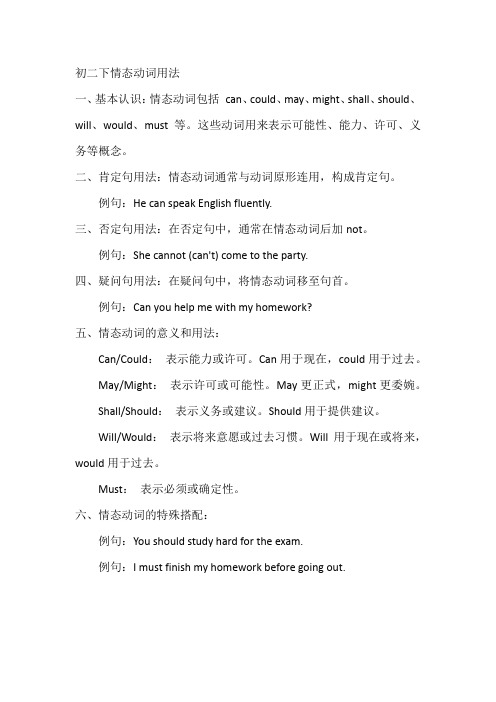
初二下情态动词用法
一、基本认识:情态动词包括can、could、may、might、shall、should、will、would、must等。
这些动词用来表示可能性、能力、许可、义务等概念。
二、肯定句用法:情态动词通常与动词原形连用,构成肯定句。
例句:He can speak English fluently.
三、否定句用法:在否定句中,通常在情态动词后加not。
例句:She cannot (can't) come to the party.
四、疑问句用法:在疑问句中,将情态动词移至句首。
例句:Can you help me with my homework?
五、情态动词的意义和用法:
Can/Could:表示能力或许可。
Can用于现在,could用于过去。
May/Might:表示许可或可能性。
May更正式,might更委婉。
Shall/Should:表示义务或建议。
Should用于提供建议。
Will/Would:表示将来意愿或过去习惯。
Will用于现在或将来,would用于过去。
Must:表示必须或确定性。
六、情态动词的特殊搭配:
例句:You should study hard for the exam.
例句:I must finish my homework before going out.。
英语词汇学习----can,may,must 等情态动词在陈述句中的用法

英语词汇学习----can,may,must 等情态动词在陈述
句中的用法
1. can 的用法:
(1)表示能力、许可、可能性。
表示能力时一般译为“能、会”,即有种能力,尤其是生来具备的能力.如:She can swim fast, but I can’t . 她能游得很快,但我不能。
(2)表示许可,常在口语中。
如:You can use my dictionary. 你可以用我的字典。
(3)表示推测,可能性,意为“可能”,常用于否定句和疑问句中,此时can’t 译为“不可能”。
如:
—Can it be our teacher?
那个人有可能是我们老师吗?
—No, it can’t be our teacher. He is on a visit to the Great Wall.不可能。
咱们老师正在游览长城呢。
(4)could的用法:
(1)can的过去式,意为“能、会”,表示过去的能力。
如:
He could write poems when he was 10.
他十岁时就会写诗。
(2). could在疑问句中,表示委婉的语气,此时could 没有过去式。
英语:can may must用法总结

can may must的用法情态动词有can (could), may (might), must, have to, shall (should,will (would),dare (dared), need (needed),ought to等. 情态动词无人称和数的变化;不能单独使用,必须与其后的动词原形构成谓语一、can, could1)表示能力(体力、知识、技能)。
Can you lift this heavy box?(体力)Mary can speak three languages。
(知识)Can you skate?(技能)此时可用be able to代替。
Can只有一般现在时和一般过去式;而be able to则有更多的时态.I’ll not be able to come this afternoon.当表示“经过努力才得以做成功某事"时应用be able to,不能用Can。
如:He was able to go to the party yesterday evening in spite of the heavy rain。
2)表示请求和允许。
-————Can I go now?—-——- Yes, you can。
/ No, you can’t。
此时可与may互换.在疑问句中还可用could,might代替,不是过去式,只是语气更委婉,不能用于肯定句和答语中。
———— Could I come to see you tomorrow?———- Yes,you can. ( No, I'm afraid not。
)3) 表示客观可能性(客观原因形成的能力).They’ve c hanged the timetable,so we can go by bus instead。
This hall can hold 500 people at least。
canmaymust的用法区别
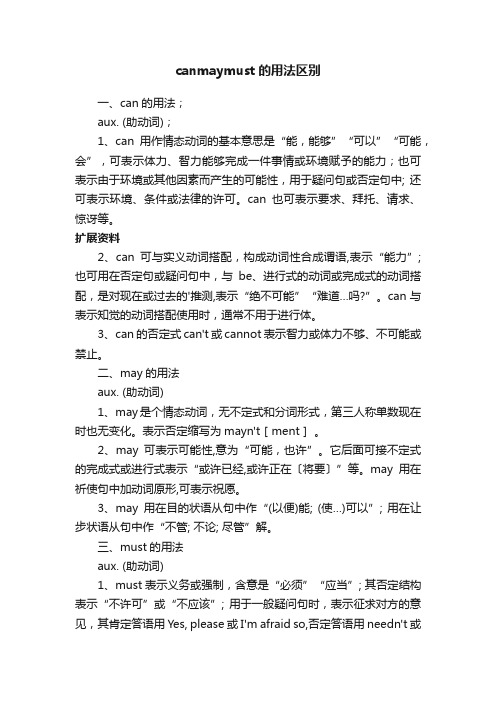
canmaymust的用法区别一、can的用法;aux. (助动词);1、can用作情态动词的基本意思是“能,能够”“可以”“可能,会”,可表示体力、智力能够完成一件事情或环境赋予的能力;也可表示由于环境或其他因素而产生的可能性,用于疑问句或否定句中; 还可表示环境、条件或法律的许可。
can也可表示要求、拜托、请求、惊讶等。
扩展资料2、can可与实义动词搭配,构成动词性合成谓语,表示“能力”; 也可用在否定句或疑问句中,与be、进行式的动词或完成式的动词搭配,是对现在或过去的'推测,表示“绝不可能”“难道…吗?”。
can与表示知觉的动词搭配使用时,通常不用于进行体。
3、can的否定式can't或cannot表示智力或体力不够、不可能或禁止。
二、may的用法aux. (助动词)1、may是个情态动词,无不定式和分词形式,第三人称单数现在时也无变化。
表示否定缩写为mayn't[ment]。
2、may可表示可能性,意为“可能,也许”。
它后面可接不定式的完成式或进行式表示“或许已经,或许正在〔将要〕”等。
may用在祈使句中加动词原形,可表示祝愿。
3、may用在目的状语从句中作“(以便)能; (使…)可以”; 用在让步状语从句中作“不管; 不论; 尽管”解。
三、must的用法aux. (助动词)1、must表示义务或强制,含意是“必须”“应当”; 其否定结构表示“不许可”或“不应该”; 用于一般疑问句时,表示征求对方的意见,其肯定答语用Yes, please或I'm afraid so,否定答语用needn't或don't have to; must在间接引语中表过去。
2、must表示必然性,一般只用于肯定句中,有时表示“意愿”,带有感情色彩。
3、must表示推测,暗含很大的可能性,一般只用于肯定句中,在否定句中表示推测用can't而不能用mustn't。
情态动词can may must的用法
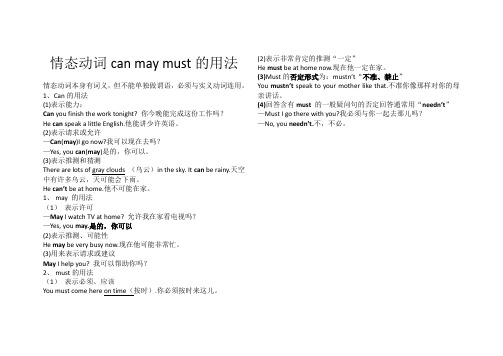
情态动词can may must的用法情态动词本身有词义,但不能单独做谓语,必须与实义动词连用。
1、Can的用法(1)表示能力:Can you finish the work tonight? 你今晚能完成这份工作吗?He can speak a little English.他能讲少许英语。
(2)表示请求或允许—Can(may)I go now?我可以现在去吗?—Yes, you can(may)是的,你可以。
(3)表示推测和猜测There are lots of gray clouds (乌云)in the sky. It can be rainy.天空中有许多乌云,天可能会下雨。
He can’t be at home.他不可能在家。
1、may 的用法(1)表示许可—May I watch TV at home? 允许我在家看电视吗?—Yes, you may.是的,你可以(2)表示推测、可能性He may be very busy now.现在他可能非常忙。
(3)用来表示请求或建议May I help you? 我可以帮助你吗?2、must的用法(1)表示必须、应该You must come here on time(按时).你必须按时来这儿。
(2)表示非常肯定的推测“一定”He must be at home now.现在他一定在家。
(3)Must的否定形式为:mustn’t“不准、禁止”You mustn’t speak to your mother like that.不准你像那样对你的母亲讲话。
(4)回答含有must的一般疑问句的否定回答通常用“needn’t”—Must I go there with you?我必须与你一起去那儿吗?—No, you needn’t.不,不必。
初中情态动词can,may,must 用法

一、明显区分:l.只可用can(could),表示“能力”(体力、知识、技能)例:①I can swim now,but I couldn’t last year.②Can you play me piano?Yes,I can.May:用于祈使句,表示祝愿。
May you succeed!Must:表示必须You must come in time.2.can(could)适用于各种句型和人称。
例:①肯定句:I(You,He)can swim.②否定句:I(You,He)can’t swim.③疑问句:Can I(you,he)swim?二、表示“请求”或“许可”。
can、may、must都可用,但语气和程度不同。
1.can(could)用于各种句型和大部分人称。
例:①肯定句:You(He,We)can go now.②否定句:You(He,We)can’t go now.③疑问句:Can I(you,he)go now?Yes,you can.(No,you can’t.)2.may(might)用于各种句型,但在肯定句和否定句中不用于第一称;在疑问句中不用于第二人称。
例:①肯定句:You(He)may go now.②否定句:You(He)may not go now.③疑问句:May I(he)go now?正规回答:(表定)Yes,you may.(Yes, you can)(No,you can’t./No,you mustnt.)(否定)No,you may not.口语化回答:(肯定)Yes,please.(Certainly.)(否定)No,please don’t.(No,of course not.)3.must用于各种句型和大部分人称。
例:①肯定句:I(You,He)must go now.②否定句:You(He)mustn’t go now.③疑问句:Must(you,he)go now?肯定回答:Yes,you must.否定回答:No,you needn’t.(No,you don’t have to.)4.试比较:You may not smoke here.(不可以)语气轻You can’t smoke here.(不能)重You mustn’t smoke here.(决不可)最重三、表示“可能”、“或许”和“推测”之意。
- 1、下载文档前请自行甄别文档内容的完整性,平台不提供额外的编辑、内容补充、找答案等附加服务。
- 2、"仅部分预览"的文档,不可在线预览部分如存在完整性等问题,可反馈申请退款(可完整预览的文档不适用该条件!)。
- 3、如文档侵犯您的权益,请联系客服反馈,我们会尽快为您处理(人工客服工作时间:9:00-18:30)。
isn’t she 7.Mary must be in the room,___________ ? 8.You must live near my friend if you live in the don’t you New Street,____________ ? hasn’t he 9.Mike must have studied French ,___________?
㈢。构成的反意疑问句
⑴。必须—mustn’t/ne must work hard at maths,____________ ? 2.You must realize that we can’t allow such behavior, mustn’t you _____________ ? ⑵。有必要—needn’t needn’t they 3.They must to there at once, _________________ ? 4.The houses must be clean if there are guests, needn’t they ? _________
5.May I speak to you for a moment,professor? 6.Can I have a cup of tea, mother?
2.猜测、可能性(用于肯定句中) 1.The story may or may not be true.
2.Can that be true? May that be true? 3.He can’t know the truth. 他不可能知道真相。 He may not know the truth. 他可能不知道真相。
⑶。mustn’t禁止、不许—may/must must/may you 5.You mustn’t talk like that ,_____________? 6.Students mustn’t talk during lessons, must/may they ______________ ? ⑷。猜测—与must后的动词一致
1.You may go home now,Susan. 2.You may not smoke in the classroom. 3.May I sit down? —Certainly./ Yes,please./ Why not?/ Sure. —No, I am sorry./ I’m afraid you can’t. 4.I may borrow this book, mayn’t I?
㈢.常用句型 1. could have done 本来能够做 2. can/could… have done ? 可能做过…吗? 3. can’t/couldn’t have done 不可能做过
1.She could have explained the matter.
2.Can she have told a lie?
情态动词 ㈠
can的用法 may的用法
must的用法
王家春
can的用法
㈠. 1.能力 2.许可
1.I can lift the stone.
3.猜测(用于疑问句、否定句)
2.You can borrow my bike tomorrow.
3.Can it be true? 4.It can’t be true.
㈡.can与be able to的区别
can有现在时、过去时;可用于被动语态。 be able to有各种时态;指某一次动作;不可用于被动语态。
1.He says he will be able to be home for Christmas.
2.I was able to help you yesterday. 3.This problem can be settled at once.
㈡。may have done 可能做过
1.she may have missed the bus. 2.It may have drizzled during the night.
must的用法
㈠。1.必须、一定 2 .偏偏 3.猜测(用于肯定句)
1.You must get up much earlier. 2.You must not speak ill of others. 3.Must we wash the dishes at once/ Yes, you must. No, you needn’t ./ you don’t have to. 4.Our boy must do the opposite to what we ordered. 5Just when I was busy , she must come and chatter.
⑸。有过去时间的短语或从句时—didn’t 10.They must have done their homework didn’t they yesterday,____________ ?
6.It’s 10 o’clock .My mother must be angry. 7.We thought our teacher must be joking.
㈡。must have done 肯定做过
1.It must have rained last night.The ground is wet. 2.No one answers the phone bell.They must have gone out.
3. Where can/could he have gone? 4.He can’t/couldn’t have said that. 5.She can’t/couldn’t have been at home all this time.
may的用法
㈠。1.许可
表示许可时,无甚区别,may较正式,can较口语化。
